4 aug 2016
|
|
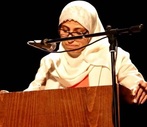
Palestinian poet and political prisoner Dareen Tatour finally returned to her hometown of Reineh, last week, after enduring various forms of Israeli detention for nearly nine months.
Her family and supporters joyously greeted her with music, food and fireworks when she arrived to the village on July 26th. Yet, Tartour’s future remains uncertain: she will remain under house arrest and electronic surveillance in her family’s home. Moreover, her trial remains ongoing. If Israeli authorities find her guilty of “incitement to violence,” she will be taken back to prison for up to eight years. Israeli forces arrested Tatour on October 11th, 2015. They charged her with incitement to violence, based on a YouTube video showcasing a poem she wrote titled Resist, My People, Resist Them, as well as two statuses and an image of Israa Abed posted on her Facebook profile. “It is ironic, but not surprising, that I was sent to jail for protesting the killing of my people whereas actual Israeli killers roam free,” Tatour told The Electronic Intifada in April. After her initial arrest, Tatour was shuffled between multiple Israeli prisons for three months. In January, Israeli authorities transferred her to strict house arrest in |
Kiyrat Ono – a suburb over 100 kilometers away from her hometown. There, in a small apartment her brother had to rent for the occasion, Tatour was trapped with round-the-clock Israeli guards, forbidden from accessing Internet, and forced to wear an ankle monitor at all times.
However, between her release from Kiryat Ono and arrival in Reineh, Tatour spent another unexpected night in Israeli prison. At a court hearing on July 25th, the private for-profit ankle monitor company failed to produce a report required to approve Tatour’s transfer to Reineh. In anticipation of “negative reply” from operators of the ankle monitor, the judge detained Tatour. She had expressed that she would prefer jail to the draconian conditions of her house arrest.
Tartour court proceedings continued the following day. But, the surveillance company did not produce the requied report. In lieu of the surveillance report, Israeli authorities decided that Tatour should be taken back to prison. However, when the Israeli guards arrived with Tatour at Damoun prison, the prison authorities maintained the court had “released her” and refused to lock her up.
Though Tatour was stranded at the prison for some time, eventually her family was able to rescue her and happily take her home. A meeting with the surveillance company was scheduled for the following day.
On Thursday, Tatour told +972: “I feel much better now that I am in my home with my parents. Maybe I am nearing the end of the nightmare. Now I can have guests — I would be happy to meet the people who supported me.”
Solidarity with Tatour has grown over the course of her case. Demonstrations, vigils, and poetry nights for her freedom have been held in Haifa, Nazareth Jaffa, London, New York and Philadelphia.
Moreover, over 400 acclaimed poets and writers, including Alice Walker, Viet Thanh Nguyen and Eve Ensler, signed a letter calling for Tatour’s freedom. In the letter, the artists decry her arrest as evidence of the Israeli government’s “desire to silence Tatour” as “part of a larger pattern of Israeli repression against all Palestinians.”
Indeed, Tartour’s arrest is exemplary of Israel’s increasing criminalization of Palestinians’ Facebook activity since the popular uprising began in October 2015. So far, since October 2015, Israeli forces have arrested 400 Palestinians for Facebook posts.
Article author Anna Ty is a poet, activist and student of Anthropology, Gender, Sexuality, Feminism and Social Justice Studies at McGill University in Montreal.
However, between her release from Kiryat Ono and arrival in Reineh, Tatour spent another unexpected night in Israeli prison. At a court hearing on July 25th, the private for-profit ankle monitor company failed to produce a report required to approve Tatour’s transfer to Reineh. In anticipation of “negative reply” from operators of the ankle monitor, the judge detained Tatour. She had expressed that she would prefer jail to the draconian conditions of her house arrest.
Tartour court proceedings continued the following day. But, the surveillance company did not produce the requied report. In lieu of the surveillance report, Israeli authorities decided that Tatour should be taken back to prison. However, when the Israeli guards arrived with Tatour at Damoun prison, the prison authorities maintained the court had “released her” and refused to lock her up.
Though Tatour was stranded at the prison for some time, eventually her family was able to rescue her and happily take her home. A meeting with the surveillance company was scheduled for the following day.
On Thursday, Tatour told +972: “I feel much better now that I am in my home with my parents. Maybe I am nearing the end of the nightmare. Now I can have guests — I would be happy to meet the people who supported me.”
Solidarity with Tatour has grown over the course of her case. Demonstrations, vigils, and poetry nights for her freedom have been held in Haifa, Nazareth Jaffa, London, New York and Philadelphia.
Moreover, over 400 acclaimed poets and writers, including Alice Walker, Viet Thanh Nguyen and Eve Ensler, signed a letter calling for Tatour’s freedom. In the letter, the artists decry her arrest as evidence of the Israeli government’s “desire to silence Tatour” as “part of a larger pattern of Israeli repression against all Palestinians.”
Indeed, Tartour’s arrest is exemplary of Israel’s increasing criminalization of Palestinians’ Facebook activity since the popular uprising began in October 2015. So far, since October 2015, Israeli forces have arrested 400 Palestinians for Facebook posts.
Article author Anna Ty is a poet, activist and student of Anthropology, Gender, Sexuality, Feminism and Social Justice Studies at McGill University in Montreal.
3 aug 2016
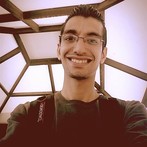
Majd Oweida’s parents had to wait almost four months before they could visit their son in jail.
“I cannot describe what it’s like to see your beloved son behind bars,” said Maha Oweida, Majd’s mother. “I could not hug him or even talk to him properly. They only allowed me see him from behind a glass screen and talk to him with a telephone handset.”
That visit took place in Ashkelon prison, in the south of Israel, during June. Majd had been in detention since he was arrested at Erez checkpoint between Gaza and Israel in February.
The Israeli authorities have charged Majd, a computer engineer, with electronic espionage.
At a court hearing in March, it was alleged that he led a cyber team for the armed wing of Islamic Jihad. He is accused of intercepting Israeli drone feeds, writing a program for gathering data from Tel Aviv’s Ben Gurion Airport and hacking signals from cameras placed on streets by the Israeli police.
His family reject the allegations. “He did not have any political or military affiliations,” Majd’s father, Jawad, said.
Though Majd has long been interested in computers, his family insists that he would not have had the skill to develop the kind of elaborate hacking operation Israel claims he ran.
“These accusations are totally false,” his mother said.
Majd’s case was reported by the international press after the charges against him were announced. While his plight has not been reported more recently, his family are still trying to raise awareness.
They regularly join other relatives of prisoners at sit-in protests opposite the Red Cross offices in Gaza City.
Psychological pressure?
As well as being a computer engineer, Majd is a lover of music. He worked as a scout for the TV program Arabs Got Talent and obtained a license to set up a Palestine-focused version of the show.
Majd was on his way to Ramallah when he was arrested. He had been granted an Israeli permit to leave Gaza so that he could visit the occupied West Bank and meet Arabs Got Talent staff.
When they visited him in Ashkelon, Majd’s parents were relieved that he was in good form.
But human rights advocates are perturbed by how Israel has issued a ban on reporting details of Majd’s interrogation.
Mervat an-Nahal, a lawyer working with the Al Mezan Center for Human Rights in Gaza, said “Majd might have been subjected to torture and psychological pressure.”
For 19 days following his arrest, Majd was not allowed to see a lawyer, according to an-Nahal. She added that the lawyer who went to see him at the end of those 19 days has been forbidden from revealing any details about his interrogation.
“Majd’s arrest is part of a systematic policy through which the Israeli occupation takes away the most basic rights of the Palestinian people,” an-Nahal said.
Majd’s next court appearance is scheduled for 21 August, his family have been told.
“Media show”
“This case is a media show for the Israeli public,” said Jawad, Majd’s father. “Israel is trying to prove to its people that it has scored a serious security goal by arresting my son Majd. The Israeli media are reporting the case as if someone who had been wanted for years has been caught. They have resorted to a lot of exaggeration.”
The mass circulation newspaper Israel Hayom, for example, has reported uncritically on allegations against Majd made by the Israeli authorities during a court hearing.
Among the claims are that a senior member of Islamic Jihad bought specialist equipment for Majd in the US and smuggled the equipment into Gaza. According to the newspaper, Majd was able to use the equipment to hack into Israel’s drone camera systems and discover that particular Palestinian resistance fighters were under surveillance.
It is not unusual for Israel to arrest Palestinians seeking to travel through Erez.
A recent report [PDF] by the Palestinian Centre for Human Rights stated that three civilians were arrested at Erez during the month of June. One of the three was accompanying a family member who was traveling to an Israeli hospital for treatment.
Erez is the only checkpoint through which people in Gaza may travel to Israel or the West Bank.
Since imposing a tightened siege on Gaza in 2007, Israel has only allowed the Strip’s inhabitants to travel through Erez in exceptional cases. Among those theoretically allowed to leave via Erez are patients with serious conditions, businesspeople, elderly pilgrims en route to Jerusalem, family members of prisoners detained inside Israel and workers with international humanitarian and development organizations.
In practice, however, Israel has blocked many people’s travel plans, even when they have been granted permits. For nine days in June, Israel stopped patients from leaving Gaza via Erez, except in a number of urgent cases.
Like most people in Gaza, Majd Oweida has only been able to travel on rare occasions.
Following Israel’s 2014 attack on Gaza, he joined the youth band al-Takht al-Sharki on a trip to Beirut. The group left through the Egyptian-controlled Rafah crossing in southern Gaza, which is also frequently closed.
“I cannot describe what it’s like to see your beloved son behind bars,” said Maha Oweida, Majd’s mother. “I could not hug him or even talk to him properly. They only allowed me see him from behind a glass screen and talk to him with a telephone handset.”
That visit took place in Ashkelon prison, in the south of Israel, during June. Majd had been in detention since he was arrested at Erez checkpoint between Gaza and Israel in February.
The Israeli authorities have charged Majd, a computer engineer, with electronic espionage.
At a court hearing in March, it was alleged that he led a cyber team for the armed wing of Islamic Jihad. He is accused of intercepting Israeli drone feeds, writing a program for gathering data from Tel Aviv’s Ben Gurion Airport and hacking signals from cameras placed on streets by the Israeli police.
His family reject the allegations. “He did not have any political or military affiliations,” Majd’s father, Jawad, said.
Though Majd has long been interested in computers, his family insists that he would not have had the skill to develop the kind of elaborate hacking operation Israel claims he ran.
“These accusations are totally false,” his mother said.
Majd’s case was reported by the international press after the charges against him were announced. While his plight has not been reported more recently, his family are still trying to raise awareness.
They regularly join other relatives of prisoners at sit-in protests opposite the Red Cross offices in Gaza City.
Psychological pressure?
As well as being a computer engineer, Majd is a lover of music. He worked as a scout for the TV program Arabs Got Talent and obtained a license to set up a Palestine-focused version of the show.
Majd was on his way to Ramallah when he was arrested. He had been granted an Israeli permit to leave Gaza so that he could visit the occupied West Bank and meet Arabs Got Talent staff.
When they visited him in Ashkelon, Majd’s parents were relieved that he was in good form.
But human rights advocates are perturbed by how Israel has issued a ban on reporting details of Majd’s interrogation.
Mervat an-Nahal, a lawyer working with the Al Mezan Center for Human Rights in Gaza, said “Majd might have been subjected to torture and psychological pressure.”
For 19 days following his arrest, Majd was not allowed to see a lawyer, according to an-Nahal. She added that the lawyer who went to see him at the end of those 19 days has been forbidden from revealing any details about his interrogation.
“Majd’s arrest is part of a systematic policy through which the Israeli occupation takes away the most basic rights of the Palestinian people,” an-Nahal said.
Majd’s next court appearance is scheduled for 21 August, his family have been told.
“Media show”
“This case is a media show for the Israeli public,” said Jawad, Majd’s father. “Israel is trying to prove to its people that it has scored a serious security goal by arresting my son Majd. The Israeli media are reporting the case as if someone who had been wanted for years has been caught. They have resorted to a lot of exaggeration.”
The mass circulation newspaper Israel Hayom, for example, has reported uncritically on allegations against Majd made by the Israeli authorities during a court hearing.
Among the claims are that a senior member of Islamic Jihad bought specialist equipment for Majd in the US and smuggled the equipment into Gaza. According to the newspaper, Majd was able to use the equipment to hack into Israel’s drone camera systems and discover that particular Palestinian resistance fighters were under surveillance.
It is not unusual for Israel to arrest Palestinians seeking to travel through Erez.
A recent report [PDF] by the Palestinian Centre for Human Rights stated that three civilians were arrested at Erez during the month of June. One of the three was accompanying a family member who was traveling to an Israeli hospital for treatment.
Erez is the only checkpoint through which people in Gaza may travel to Israel or the West Bank.
Since imposing a tightened siege on Gaza in 2007, Israel has only allowed the Strip’s inhabitants to travel through Erez in exceptional cases. Among those theoretically allowed to leave via Erez are patients with serious conditions, businesspeople, elderly pilgrims en route to Jerusalem, family members of prisoners detained inside Israel and workers with international humanitarian and development organizations.
In practice, however, Israel has blocked many people’s travel plans, even when they have been granted permits. For nine days in June, Israel stopped patients from leaving Gaza via Erez, except in a number of urgent cases.
Like most people in Gaza, Majd Oweida has only been able to travel on rare occasions.
Following Israel’s 2014 attack on Gaza, he joined the youth band al-Takht al-Sharki on a trip to Beirut. The group left through the Egyptian-controlled Rafah crossing in southern Gaza, which is also frequently closed.
|
|
The group made an emotional appearance on Arabs Got Talent. Majd was filmed shedding tears behind the scenes.
“We are proud of him,” said Majd’s brother Amjad, who has also been working on a spin-off version of the show called Palestinians Got Talent. “We will follow Majd’s example of nurturing Palestinian talent until he is free,” Amjad added. Majd’s father, Jawad, concurred: “My son did not harm anybody. His energies were focused on discovering talent. Maram Humaid is a Gaza-based translator and journalist. |
2 aug 2016
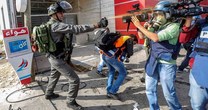
The Journalist Support Committee (JSC) said that Israel's military and security forces committed 47 violations against journalists and media workers during July 2016.
In a recent report, the JSC said that the Israeli army and police arrested eight Palestinian journalists from Jerusalem, Qalqilya and Ramallah, and released most of them later during the month.
The Israeli authorities also extended the detention of journalist Adib al-Attrash and postponed the trial of another one called Samah Duweik.
According to the report, an administratively detained journalist named Malik al-Qadi was reportedly exposed to torture and maltreatment in an Israeli jail, which prompted him to go on hunger strike.
Other violations against journalists during the reporting month included raids on homes, confiscation of cars and cameras, assaults, harassment, banishment orders and removal of Facebook pages.
The report also highlighted several violations committed by the Palestinian Authority security apparatuses, including the arrest of journalists Mohamed Abu Juhaisha and Mohamed Khabisa, raids on homes, and banning journalists from holding a news conference.
In a recent report, the JSC said that the Israeli army and police arrested eight Palestinian journalists from Jerusalem, Qalqilya and Ramallah, and released most of them later during the month.
The Israeli authorities also extended the detention of journalist Adib al-Attrash and postponed the trial of another one called Samah Duweik.
According to the report, an administratively detained journalist named Malik al-Qadi was reportedly exposed to torture and maltreatment in an Israeli jail, which prompted him to go on hunger strike.
Other violations against journalists during the reporting month included raids on homes, confiscation of cars and cameras, assaults, harassment, banishment orders and removal of Facebook pages.
The report also highlighted several violations committed by the Palestinian Authority security apparatuses, including the arrest of journalists Mohamed Abu Juhaisha and Mohamed Khabisa, raids on homes, and banning journalists from holding a news conference.

'To murder, to rape, to burn, to destroy, to eradicate' are just some of the common phrases posted on the web every 3 seconds; Knesset lobby to review new findings that last year saw 175,000 calls to violence; MK: 'Soon it will erupt on the streets.'
New research revealing concerning figures on the levels of violence which has permeated the internet will be presented in the Knesset on Tuesday.
According to the research, which was conducted by The Berl Katznelson Foundation and the research company Vigo, every three seconds an internet surfer calls for acts of violence.
Moreover, during the last year alone 175,000 instances of calls to violence on social media were recorded, a third of which included direct violent threats such as “I will kill you”. The remaining two thirds were indirect calls to violence.
The majority of the violent posts on the internet (83 percent) were uploaded by men, 66% of whom were below the age of 30. Seventy percent of these people share profiles identifying with the political right.
The findings come as part of a research report addressing the subject of hate on the internet and will be presented to a Knesset lobby group which strives to remove violence and incitement from the web.
The calls for violence are mainly directed against Arabs (50%) and also against people to the left of the political spectrum (20%) while 15% of the calls were against the LGBT community. The most common expressions written include “to kill,” “to destroy,” “to break,” “to rape,” and “to annihilate.”
“The breadth of the violence bring us to the realization that a large proportion of the public occupies the internet as no man’s land and a place without law and order,” said Anat Rosilio who manages the hate report project.
“The reality that every three seconds there is a call to violence on the internet must be a cause for concern,” said the chairman of the lobby for removing violence from the internet MK Revital Swid (Zionist Union).
“The internet causes a virtual bloodshed. As the chairwoman of the lobby I met with people who have fallen victim to this, who cry and don’t leave their homes because of violence on the web,” she continued.
“When will we internalize the fact that words kill? The hate report teaches that we are raising a violent generation and not long from now the violence will erupt into the streets,” Swid warned. “The difference between calls to violence which fuels hatred and actual physical violence is a mere step. It is our responsibility to act to remove violence from the internet.”
New research revealing concerning figures on the levels of violence which has permeated the internet will be presented in the Knesset on Tuesday.
According to the research, which was conducted by The Berl Katznelson Foundation and the research company Vigo, every three seconds an internet surfer calls for acts of violence.
Moreover, during the last year alone 175,000 instances of calls to violence on social media were recorded, a third of which included direct violent threats such as “I will kill you”. The remaining two thirds were indirect calls to violence.
The majority of the violent posts on the internet (83 percent) were uploaded by men, 66% of whom were below the age of 30. Seventy percent of these people share profiles identifying with the political right.
The findings come as part of a research report addressing the subject of hate on the internet and will be presented to a Knesset lobby group which strives to remove violence and incitement from the web.
The calls for violence are mainly directed against Arabs (50%) and also against people to the left of the political spectrum (20%) while 15% of the calls were against the LGBT community. The most common expressions written include “to kill,” “to destroy,” “to break,” “to rape,” and “to annihilate.”
“The breadth of the violence bring us to the realization that a large proportion of the public occupies the internet as no man’s land and a place without law and order,” said Anat Rosilio who manages the hate report project.
“The reality that every three seconds there is a call to violence on the internet must be a cause for concern,” said the chairman of the lobby for removing violence from the internet MK Revital Swid (Zionist Union).
“The internet causes a virtual bloodshed. As the chairwoman of the lobby I met with people who have fallen victim to this, who cry and don’t leave their homes because of violence on the web,” she continued.
“When will we internalize the fact that words kill? The hate report teaches that we are raising a violent generation and not long from now the violence will erupt into the streets,” Swid warned. “The difference between calls to violence which fuels hatred and actual physical violence is a mere step. It is our responsibility to act to remove violence from the internet.”
1 aug 2016
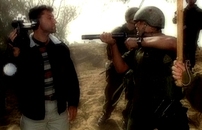
The Palestine News Agency WAFA, on Monday, monitored incitement and racism published in the Israeli media against Palestinians and Arabs between June 15 and 21 July, 2016.
The 296 issue of the report, reviewed a number of articles and op-ed published by Israeli writers and journalists, which incite against Palestinians and Arabs both directly and indirectly.
Maariv newspaper published a racist article on July 7 by Michael Kleiner, in which he attacked Arab member of the Israeli Knesset Hanin Zoabi as a woman and aan Arab and promoted stereotypical ideas about Arabs.
He asked if the 47-year-old Syria-born single woman would have been allowed to apply makeup, leave the house without a head cover, join protests, wave flags or board a Turkish flotilla, establish a career, receive a salary and appear on media outlets if she was still in Syria, or would she be busy taking care of homeless children that she birthed after being forced to marry an old man and fighting with her husband’s younger wife that was recently added to the family?
Kleiner said that Zoabi is lucky that Jews rejected the Uganda plan and returned to their ancestor’s land where they paved roads, built universities in Jerusalem and Haifa and established a western country where Zoabi can were pants, fight for the rights of women and homosexuals and express her extreme and violent ideas under the pretext of freedom of expression.
Meanwhile, Ze’ev Kam criticized, in a video published on July 19 on NRG website, Arab member of the Knesset Yousef Jabarin, who said that Israel assassinated former leader Yassir Arafat.
Kam said, “There is an Arab member in our Knesset who is extremely jealous of Zoabi and he wishes to receive the same media attention that the former receives. His name is Yousef Jabarin. You do not know him, but he is doing everything possible to gain fame.”
Kam asked Jabarin about the evidence, which supports his groundless claims. The Israeli journalist described Jabarin’s claims as part of Palestinian culture which promotes lies.
NRG website also published an article by Sara Cohen in which she attacked the Israeli army radio station for broadcasting poems by Palestinian poet Mahmoud Darwish.
She said, “Darwish’s war is the word and his narrative is the Palestinians. The problem lies when we adopt his narrative and mock the words that we do not understand.”
She warned against upholding art, culture, and diversity, which give right to expelling Jews through the use of knives and gunfire.
The 296 issue of the report, reviewed a number of articles and op-ed published by Israeli writers and journalists, which incite against Palestinians and Arabs both directly and indirectly.
Maariv newspaper published a racist article on July 7 by Michael Kleiner, in which he attacked Arab member of the Israeli Knesset Hanin Zoabi as a woman and aan Arab and promoted stereotypical ideas about Arabs.
He asked if the 47-year-old Syria-born single woman would have been allowed to apply makeup, leave the house without a head cover, join protests, wave flags or board a Turkish flotilla, establish a career, receive a salary and appear on media outlets if she was still in Syria, or would she be busy taking care of homeless children that she birthed after being forced to marry an old man and fighting with her husband’s younger wife that was recently added to the family?
Kleiner said that Zoabi is lucky that Jews rejected the Uganda plan and returned to their ancestor’s land where they paved roads, built universities in Jerusalem and Haifa and established a western country where Zoabi can were pants, fight for the rights of women and homosexuals and express her extreme and violent ideas under the pretext of freedom of expression.
Meanwhile, Ze’ev Kam criticized, in a video published on July 19 on NRG website, Arab member of the Knesset Yousef Jabarin, who said that Israel assassinated former leader Yassir Arafat.
Kam said, “There is an Arab member in our Knesset who is extremely jealous of Zoabi and he wishes to receive the same media attention that the former receives. His name is Yousef Jabarin. You do not know him, but he is doing everything possible to gain fame.”
Kam asked Jabarin about the evidence, which supports his groundless claims. The Israeli journalist described Jabarin’s claims as part of Palestinian culture which promotes lies.
NRG website also published an article by Sara Cohen in which she attacked the Israeli army radio station for broadcasting poems by Palestinian poet Mahmoud Darwish.
She said, “Darwish’s war is the word and his narrative is the Palestinians. The problem lies when we adopt his narrative and mock the words that we do not understand.”
She warned against upholding art, culture, and diversity, which give right to expelling Jews through the use of knives and gunfire.
31 july 2016
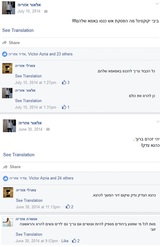
In Facebook posts from 2014, soldier accused of manslaughter after shooting dead wounded terrorist in Hebron calls the PM 'fa**ot', while his mother urges 'Enough with being humane, if need be we need to kill women and children as well.'
Facebook posts from 2014 made by Sgt. Elor Azaria, in which he curses Prime Minister Benjamin Netanyahu, have recently resurfaced online.
Azaria, who is facing manslaughter charges after shooting dead a wounded terrorist, expressed his anger at the prime minister's decisions during Operation Protective Edge. "Bibi, you fa**ot, why a ceasefire? Hit them hard!!!" Azaria wrote on July 15, while the 50-day war was still ongoing.
His father, Charlie Azaria, who received a phone call of support from Netanyahu after the Hebron shooting incident, agreed with his son, saying "Well done, you have to hit them really hard!"
"Yes, kill them all," Azaria agreed.
In another post from June 30 of that year, Azaria, who was still in high school at the time, declared "Kahane was right!" referring to Meir Kahane, a radical right-wing rabbi who was barred, along with his followers, of holding public office due to his extremist views against Arabs.
Azaria's mother Oshra responded to the post, saying "Death to anyone who hurts Jews. Enough with being humane, if need be we need to kill women and children as well, starting with (Zoabi)."
Screenshots of the two posts made the rounds on social media on Saturday night.
The military prosecution has, in the past, considered using these posts in their case against him, but eventually decided against it.
Sources close to the soldier said in response that "this is recycling of things that were posted in the past, which are not relevant to the trial, and is done to hurt Elor. When these posts were written out of pain during Protective Edge, (Elor) was still a teenager, not a soldier yet.
The Azaria family has a lot of respect to Mr. Netanyahu. Those who are running this despicable campaign against a combat soldier in the IDF are the same people who embrace and offer condolences to families of murderous terrorists. The people of Israel support the soldier and no post will change that."
Facebook posts from 2014 made by Sgt. Elor Azaria, in which he curses Prime Minister Benjamin Netanyahu, have recently resurfaced online.
Azaria, who is facing manslaughter charges after shooting dead a wounded terrorist, expressed his anger at the prime minister's decisions during Operation Protective Edge. "Bibi, you fa**ot, why a ceasefire? Hit them hard!!!" Azaria wrote on July 15, while the 50-day war was still ongoing.
His father, Charlie Azaria, who received a phone call of support from Netanyahu after the Hebron shooting incident, agreed with his son, saying "Well done, you have to hit them really hard!"
"Yes, kill them all," Azaria agreed.
In another post from June 30 of that year, Azaria, who was still in high school at the time, declared "Kahane was right!" referring to Meir Kahane, a radical right-wing rabbi who was barred, along with his followers, of holding public office due to his extremist views against Arabs.
Azaria's mother Oshra responded to the post, saying "Death to anyone who hurts Jews. Enough with being humane, if need be we need to kill women and children as well, starting with (Zoabi)."
Screenshots of the two posts made the rounds on social media on Saturday night.
The military prosecution has, in the past, considered using these posts in their case against him, but eventually decided against it.
Sources close to the soldier said in response that "this is recycling of things that were posted in the past, which are not relevant to the trial, and is done to hurt Elor. When these posts were written out of pain during Protective Edge, (Elor) was still a teenager, not a soldier yet.
The Azaria family has a lot of respect to Mr. Netanyahu. Those who are running this despicable campaign against a combat soldier in the IDF are the same people who embrace and offer condolences to families of murderous terrorists. The people of Israel support the soldier and no post will change that."
25 july 2016
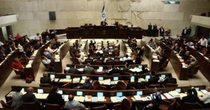
A new bill proposing fines for social media sites that do not remove anti-occupation content received the Israeli government’s approval on Sunday, the Jerusalem Post reported.
The Ministerial Committee for Legislation approved a bill authored by MK Revital Swid (Zionist Union) giving social media providers, including Facebook, YouTube, and Twitter, 48 hours to remove anti-Israel content.
Social media platforms that neglect to remove incitement will be fined $78,000 per post. If it emerges that the site was aware of the post, for example, if it was quoted in major news outlets, but still did not remove it, the fine will be increased.
The legislation classifies terror-inciting posts as those that call to or encourage anti-occupation activism and attacks. The bill enjoys widespread support in the current Knesset, with 21 MKs signed as sponsors from a broad cross-section of extremist parties. It sailed through its preliminary vote by 50 to 4, with one abstention.
But, Arab MK Abdul Hakim Hajj Yahya of the Joint (Arab) List objected to the bill, saying it was intended to target Arab social media users. “All of these laws are only implemented against the Arabs,” he said. “Why doesn’t this law have a section about calls to racism, why only terror? This law is another racist law and another law that continues to express the discrimination [against Arabs].”
In March of 2016, Facebook figures said some 296,000 posts and 136,000 photos are published on the network each minute from its estimated 1.09 billion active daily users.
The Ministerial Committee for Legislation approved a bill authored by MK Revital Swid (Zionist Union) giving social media providers, including Facebook, YouTube, and Twitter, 48 hours to remove anti-Israel content.
Social media platforms that neglect to remove incitement will be fined $78,000 per post. If it emerges that the site was aware of the post, for example, if it was quoted in major news outlets, but still did not remove it, the fine will be increased.
The legislation classifies terror-inciting posts as those that call to or encourage anti-occupation activism and attacks. The bill enjoys widespread support in the current Knesset, with 21 MKs signed as sponsors from a broad cross-section of extremist parties. It sailed through its preliminary vote by 50 to 4, with one abstention.
But, Arab MK Abdul Hakim Hajj Yahya of the Joint (Arab) List objected to the bill, saying it was intended to target Arab social media users. “All of these laws are only implemented against the Arabs,” he said. “Why doesn’t this law have a section about calls to racism, why only terror? This law is another racist law and another law that continues to express the discrimination [against Arabs].”
In March of 2016, Facebook figures said some 296,000 posts and 136,000 photos are published on the network each minute from its estimated 1.09 billion active daily users.
22 july 2016
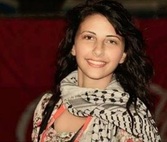
The Israeli authorities extended on Friday the detention of a Palestinian girl after she was arrested over a Facebook post.
A statement by the Israeli police claimed that the Palestinian girl Kamar Munasra wrote in a Facebook post that she wants to die while defending herself against the Israelis.
The girl was kidnapped from her own family home on Tuesday after she was accused of her intent to carry out an anti-Israeli attack.
Her remand was extended until Sunday on the same allegation. The Arab 48 news site quoted lawyer Muhammad Tarbiyeh as stating that the Israeli court ruled for extending Kamar’s detention for three days.
A statement by the Israeli police claimed that the Palestinian girl Kamar Munasra wrote in a Facebook post that she wants to die while defending herself against the Israelis.
The girl was kidnapped from her own family home on Tuesday after she was accused of her intent to carry out an anti-Israeli attack.
Her remand was extended until Sunday on the same allegation. The Arab 48 news site quoted lawyer Muhammad Tarbiyeh as stating that the Israeli court ruled for extending Kamar’s detention for three days.
